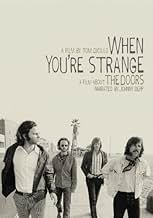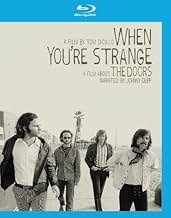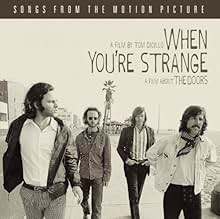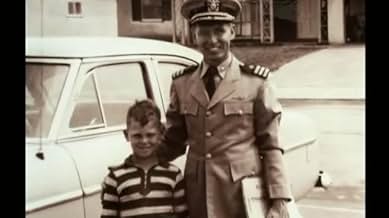CALIFICACIÓN DE IMDb
7.6/10
10 k
TU CALIFICACIÓN
Agrega una trama en tu idiomaA look at the late '60s and early '70s rock band The Doors, including rare exclusive footage.A look at the late '60s and early '70s rock band The Doors, including rare exclusive footage.A look at the late '60s and early '70s rock band The Doors, including rare exclusive footage.
- Dirección
- Guionista
- Elenco
- Premios
- 2 premios ganados y 1 nominación en total
Johnny Depp
- Narrator
- (voz)
John Densmore
- Self
- (material de archivo)
Robby Krieger
- Self
- (material de archivo)
Ray Manzarek
- Self
- (material de archivo)
Jim Morrison
- Self
- (material de archivo)
Pamela Courson
- Self
- (material de archivo)
- (as Pam Courson)
The Doors
- Themselves
- (material de archivo)
Murray Goodman
- Self - Judge
- (material de archivo)
Jimi Hendrix
- Self
- (material de archivo)
Lyndon B. Johnson
- Self
- (material de archivo)
- (as Lyndon Johnson)
George S. Morrison
- Self - Jim's Father
- (as Admiral George S. Morrison)
Paul A. Rothchild
- Self
- (material de archivo)
Adolf Hitler
- Self
- (material de archivo)
- (sin créditos)
Janis Joplin
- Self
- (material de archivo)
- (sin créditos)
John F. Kennedy
- Self
- (material de archivo)
- (sin créditos)
Robert F. Kennedy
- Self
- (material de archivo)
- (sin créditos)
- Dirección
- Guionista
- Todo el elenco y el equipo
- Producción, taquilla y más en IMDbPro
Opiniones destacadas
I attended a special screening of the music documentary "When You're Strange: A Film about The Doors" at the 2009 Los Angeles Film Festival. This was my 18th screening here and the first to be completely sold out.
Writer/director Tom DiCillo was able to gain access to original footage shot from 1966-71 by Paul Ferrara, a UCLA Film School buddy of flamboyant lead singer Jim Morrison. Those old, grainy films are all that were needed to make this stunning documentary -- no modern-day or additional footage was shot.
The dramatic voice-over was provided by Johnny Depp who, in a statement from DiCillo read prior to the screening, was the one person the filmmakers felt qualified to narrate the movie. It had to be someone with a passion for the music of The Doors, and Depp fit the bill.
With the assistance of the remaining living members, particularly band co-founder and keyboardist Ray Manzarek (who sat in front of me), the film is destined to be the definitive chronicle of the band's history. We finally discover the shocking truth behind the curious myths -- did Morrison really expose his genitals at that infamous Florida concert? Did he fake his own death? "When You're Strange" separates fact from fiction and puts to rest the many rumors surrounding the manic life and untimely death of Jim Morrison. The heretofore secret details behind the making of each amazing album (one took 11 months, another took less than a week) are mind-boggling. Naturally, there's plenty of music. Tons of it.
Like all music docs, the degree to which one connects with the film is directly proportional to one's familiarity with the music and/or artists featured in the production. This certainly applies here. Like some of the thrilling music documentaries I've seen at festivals in the past couple of years ("The U.S. vs. John Lennon," "Dixie Chicks: Shut Up and Sing," "The Wrecking Crew," "Kurt Cobain About a Son"), I put "When You're Strange" right at the top of my list. I was blown away. However, while I walked away feeling that this was an absolutely brilliant film, I have to give it a qualified thumbs up if only because there is no doubt many simply won't have the emotional response that I did. But, for fans of this music, "When You're Strange" is absolutely a must-see.
Writer/director Tom DiCillo was able to gain access to original footage shot from 1966-71 by Paul Ferrara, a UCLA Film School buddy of flamboyant lead singer Jim Morrison. Those old, grainy films are all that were needed to make this stunning documentary -- no modern-day or additional footage was shot.
The dramatic voice-over was provided by Johnny Depp who, in a statement from DiCillo read prior to the screening, was the one person the filmmakers felt qualified to narrate the movie. It had to be someone with a passion for the music of The Doors, and Depp fit the bill.
With the assistance of the remaining living members, particularly band co-founder and keyboardist Ray Manzarek (who sat in front of me), the film is destined to be the definitive chronicle of the band's history. We finally discover the shocking truth behind the curious myths -- did Morrison really expose his genitals at that infamous Florida concert? Did he fake his own death? "When You're Strange" separates fact from fiction and puts to rest the many rumors surrounding the manic life and untimely death of Jim Morrison. The heretofore secret details behind the making of each amazing album (one took 11 months, another took less than a week) are mind-boggling. Naturally, there's plenty of music. Tons of it.
Like all music docs, the degree to which one connects with the film is directly proportional to one's familiarity with the music and/or artists featured in the production. This certainly applies here. Like some of the thrilling music documentaries I've seen at festivals in the past couple of years ("The U.S. vs. John Lennon," "Dixie Chicks: Shut Up and Sing," "The Wrecking Crew," "Kurt Cobain About a Son"), I put "When You're Strange" right at the top of my list. I was blown away. However, while I walked away feeling that this was an absolutely brilliant film, I have to give it a qualified thumbs up if only because there is no doubt many simply won't have the emotional response that I did. But, for fans of this music, "When You're Strange" is absolutely a must-see.
Having been a fan for over 20 years, I'm fairly jaded when it comes to bios on the Doors. The new footage and DiCillo's narrative structure offer a truly fresh look at the subject matter, since it's the first time I've really felt I've had an insider's view on the band. Morrison is treated like a real human being, stripped of all the legend and bombast. Instead of the pretentious rock star, you get to see Jim the person evolving over time, with all the joy and suffering that he experienced. There's a shot of him exiting the courtroom in Miami with a look of vulnerability that I found shocking, as it's at odds with image of the cool, cocky singer. The history of the band is subtly told though a wash of images and sparse narration which touch all the milestones without feeling like another retread. It definitely deserves another viewing, consider me a confirmed buyer of the DVD.
"When You're Strange" is a music Documentary, which takes you through the short career of a world famous 1960's band, The Doors.
For this alone, the documentary is worth watching. That said, this is so interesting to watch, because it is a story with so many levels, mainly because it took place in a time, when things were changing.
It was the 1960s. A still growing group of people invented in the 50s, namely the young, could and would not be ignored any longer. As Morrison put it: 'we want the world, and we want it now' To them things were not black and white anymore. Men and women were not men and women, but human beings. The solution was definitely not war, but the absolute opposite. On the other hand the parents, and older generations, were stubbornly holding on to the old order and its values, and a larger and larger gap was growing between these two fronts.
The spotlight in this film is heavily focused on the Doors most famous member, Jim Morrison, and for a good reason. Jim Morrison became a clear symbol of the new, and the young, mainly because he wanted more out of life than the norms allowed, and simply went for it. On top of this, Jim had an interesting background, which is a prime example of the generation gap. Jim Morrisons father George Morrison was an admiral in the navy, and was involved in the Vietnam war. He was against Jim's involvement in rock music, wanted his hair cut, and to get an education. Jim ignored his parents to such an extend that he claimed his family dead, when asked by journalists.
If you know the story of The Doors and Jim Morrison already, this will be a stringent summary of the events with a well written and good narration by Johnny Depp. There is nothing new in the story itself and thankfully no conspiracy theories about Morrisons death. Where this documentary really shines and adds yet another level, is through the footage and the way this is put together. Some of this footage has never been shown before, and parts of it is still so crisp and clear that it's eerie. It is bound to send you on an emotional ride, if you were a fan when it mattered the most - when you were young.
So in conclusion this falls two stars shy of ten because of the only fall through i noticed. When a letter from Morrisons father is brought up, it mentions only one paragraph of this well meaning letter, and uses it out of context to create drama. This is a 2 star fail in an otherwise clear cut and to the bone fact telling documentary.
For this alone, the documentary is worth watching. That said, this is so interesting to watch, because it is a story with so many levels, mainly because it took place in a time, when things were changing.
It was the 1960s. A still growing group of people invented in the 50s, namely the young, could and would not be ignored any longer. As Morrison put it: 'we want the world, and we want it now' To them things were not black and white anymore. Men and women were not men and women, but human beings. The solution was definitely not war, but the absolute opposite. On the other hand the parents, and older generations, were stubbornly holding on to the old order and its values, and a larger and larger gap was growing between these two fronts.
The spotlight in this film is heavily focused on the Doors most famous member, Jim Morrison, and for a good reason. Jim Morrison became a clear symbol of the new, and the young, mainly because he wanted more out of life than the norms allowed, and simply went for it. On top of this, Jim had an interesting background, which is a prime example of the generation gap. Jim Morrisons father George Morrison was an admiral in the navy, and was involved in the Vietnam war. He was against Jim's involvement in rock music, wanted his hair cut, and to get an education. Jim ignored his parents to such an extend that he claimed his family dead, when asked by journalists.
If you know the story of The Doors and Jim Morrison already, this will be a stringent summary of the events with a well written and good narration by Johnny Depp. There is nothing new in the story itself and thankfully no conspiracy theories about Morrisons death. Where this documentary really shines and adds yet another level, is through the footage and the way this is put together. Some of this footage has never been shown before, and parts of it is still so crisp and clear that it's eerie. It is bound to send you on an emotional ride, if you were a fan when it mattered the most - when you were young.
So in conclusion this falls two stars shy of ten because of the only fall through i noticed. When a letter from Morrisons father is brought up, it mentions only one paragraph of this well meaning letter, and uses it out of context to create drama. This is a 2 star fail in an otherwise clear cut and to the bone fact telling documentary.
"When You're Strange" recounts quite well the history of the 1960s rock band "The Doors" and its famous, charismatic vocalist Jim Morrison. Using archival and backstage footage, some early home pictures of Morrison, and integrating a history of the band's roots and rocky ride with then-current social upheavals, the film conveys all the chaos, change, and creativity that marked that turbulent era.
Some of the narrative retells information that the band's devotees have known for decades, like the origin of the name "The Doors", a reference to Aldous Huxley's 1954 book "The Doors Of Perception". And the very first song Robby Krieger wrote was "Light My Fire". But old details can be informative to new fans.
The film's choppy structure probably had some symbolic significance. But the first five minutes seemed unnecessary. And I could have done without the scenes of Morrison driving a car through the desert, which seemed irrelevant and out of context.
As someone who has been mesmerized by The Doors for a long time, I don't think I learned anything new. Yet, the never-before-seen visuals, Morrison's on-stage performances and backstage personality, combined with all that strange music, at times carnivalesque and at other times bluesy, were enormously interesting. About midway through, Morrison comes across best, as he sings "Touch Me", accompanied by an orchestra.
What's disconcerting is the change in Morrison. He starts out innocent and shy, then quickly morphs into an outrageous showman. His indulgence in drugs and hard drinking did him no favors. However, that over-the-edge artistic style was common in the 1960s. And death arrived at the early age of 27 not only for Morrison, but also for Janis Joplin, Brian Jones, Jimi Hendrix, and Morrison's girlfriend, Pamela Courson.
Forty years after his death, Jim Morrison still fascinates people. Part of that derives from his untimely death. But I think he and The Doors resonate today because they were musical poets, social revolutionaries who saw the inhumanity and evil in the world, and tried to change it, through music. With maybe a couple of exceptions, we do not now have comparably influential poets. Jim Morrison and The Doors call to us from the past.
Some of the narrative retells information that the band's devotees have known for decades, like the origin of the name "The Doors", a reference to Aldous Huxley's 1954 book "The Doors Of Perception". And the very first song Robby Krieger wrote was "Light My Fire". But old details can be informative to new fans.
The film's choppy structure probably had some symbolic significance. But the first five minutes seemed unnecessary. And I could have done without the scenes of Morrison driving a car through the desert, which seemed irrelevant and out of context.
As someone who has been mesmerized by The Doors for a long time, I don't think I learned anything new. Yet, the never-before-seen visuals, Morrison's on-stage performances and backstage personality, combined with all that strange music, at times carnivalesque and at other times bluesy, were enormously interesting. About midway through, Morrison comes across best, as he sings "Touch Me", accompanied by an orchestra.
What's disconcerting is the change in Morrison. He starts out innocent and shy, then quickly morphs into an outrageous showman. His indulgence in drugs and hard drinking did him no favors. However, that over-the-edge artistic style was common in the 1960s. And death arrived at the early age of 27 not only for Morrison, but also for Janis Joplin, Brian Jones, Jimi Hendrix, and Morrison's girlfriend, Pamela Courson.
Forty years after his death, Jim Morrison still fascinates people. Part of that derives from his untimely death. But I think he and The Doors resonate today because they were musical poets, social revolutionaries who saw the inhumanity and evil in the world, and tried to change it, through music. With maybe a couple of exceptions, we do not now have comparably influential poets. Jim Morrison and The Doors call to us from the past.
After seeing Oliver Stone's version several times over the years, I was, at first, not sure this would interest me. It did very much interest me. I was born in 1960 and I grew up in this era. I had the doors albums, but did not ever see them live. I felt this doc had fresh information; especially rare footage and the bands musical background and how they improvised and contributed to the songs and concerts. If you do not know things about Jim, you do not understand his drives to the dessert and his witnessing things die, and what that death meant to him and how fascinated he was and he wrote about it. For those who say there was not music, you are all out of your minds. There was non-stop music. Really? Would be nice to hear an interview? Frankly, as a psychologist and documentarian, none of the interviews would be very valuable, as the press are morons and ask the most inane questions that infuriate me and the musicians. So instead maybe more of his poetry. But I believe they did the best they could with the footage they had, real footage; which I greatly appreciated. I think if you are curious or a fan, this is a must see.
¿Sabías que…?
- TriviaFor the first time in the band's history unprecedented access was granted, regarding the previously unseen footage of Jim Morrison.
- ErroresA mock newspaper clipping announces both that Sharon Tate and her friends have been found murdered and that Charles Manson and his "Family" are suspected. Manson and the "Family" were not identified as the Tate killers until December 1969, more than four months after the murders happened.
- Citas
Jim Morrison: The music can't help but reflecting things that are happening around you
- ConexionesEdited from Feast of Friends (1969)
Selecciones populares
Inicia sesión para calificar y agrega a la lista de videos para obtener recomendaciones personalizadas
- How long is When You're Strange?Con tecnología de Alexa
Detalles
- Fecha de lanzamiento
- País de origen
- Sitio oficial
- Idioma
- También se conoce como
- When You're Strange
- Ver más créditos de la compañía en IMDbPro
Taquilla
- Total en EE. UU. y Canadá
- USD 246,078
- Fin de semana de estreno en EE. UU. y Canadá
- USD 66,833
- 11 abr 2010
- Total a nivel mundial
- USD 1,194,182
- Tiempo de ejecución
- 1h 26min(86 min)
- Color
- Mezcla de sonido
- Relación de aspecto
- 1.85 : 1
Contribuir a esta página
Sugiere una edición o agrega el contenido que falta

































